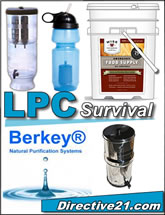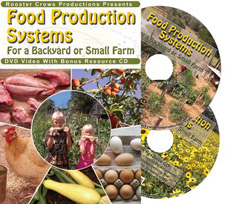Andre Evans
Activist Post
What the future brings is uncertain. It’s necessary to make preparations for any dissonance that may dislodge the comfort we experience today. On a whim, you can be left with no running water and electricity to depend on, and no store to buy food and supplies from. It’s time to be prepared.
The nature of our living situation today is comfortable, but also extremely fragile. Currently, the power to dictate the way you live rests in the hands of others. In order to regain control you must hone your survival skills, become self-sufficient, and increase your knowledge in the field of preparedness.
Anything can happen: political uprising, natural disasters, or even a freak accident. Whatever the scenario, you will be ultimately responsible your survival. Some think it’s only a matter of time until Western civilization collapses. If, or when it does, you want to be prepared, for short term and long term.
 |
| Ad – Berkey Water Purification |
The most primary of needs is water. In the event that running water is unavailable, you need to have either adequate purified water supplies, or some means to consistently produce water. Without water, you simply cannot survive a prolonged disaster. Of course this requires a source that can not only generate clean water, but can be accessed routinely without travelling great distances. If you live near a fresh water spring, you are already well on the path to being self-sufficient. Most likely, however, you will need to resort to atmospheric water generators, nearby bodies of water, and a high-quality water filtration device.
Other water storage and access solutions include: storing large quantities of drinking water, having a secret reserve, building a well in which to access fresh water reserves, and rainwater harvesting. All of these will ensure that you have enough water to last for quite some time. Water filters become especially necessary when utilizing outside water sources for drinking water. If you are ever getting water from a source outside of your own control, you must ensure it’s absolutely clean and safe. If you gather water using containers, make sure they are BPA free. Glass bottles are preferable, though BPA-free stainless steel is a tougher readiness alternative to plastics.
2. Readiness through food storage
The second most important need is food. Stockpiling large quantities of food is part of a survivalist skill that has been done throughout history. Anticipating the reality of a famine, and the scarcity of sustenance, the ancients would keep storehouses of extra food to ensure their survival through becoming self-suficient. In more recent history, your parents or grandparents probably took to a habit of canning their food, and keeping stores of supplies to be prepared in the event of a nuclear war. It used to be common practice for inhabitants of local towns to assess the amount of stored food in order to know whether or not they could sustain themselves for the winter.
You can purchase large packs of storable foods from many different companies, with varying rates of quantity and quality. Some companies will sell you chemical-packed garbage, while others offer higher quality alternatives for similar prices. You want to make sure the food you buy is non-GMO, and free of MSG. You also want to have a balanced variety of foods in your readiness safe area. You simply cannot live pleasantly off of only one food type for months and months.
Buying non perishable canned goods and dehydrated foods are viable preparedness methods that are affordable for most families. It’s also very effective to practice canning and dehydrating your own food. Americans waste enough food each day to fill a 90,000 seat stadium. Take leftovers and learn how to can and dehydrate them, ultimately storing them in your designated safe zone. It’s also important to make sure that you have your own personal preferences met. Make sure to stock up on not only foods with a very long shelf-life, but the foods you cannot do without — your very favorites.
3. Sustainable food through self-sufficient home gardening
 Ensuring you have a consistent and self-sufficient food supply with home gardening. Having stores of food is great, but they will eventually dwindle. You also want to ensure that you have more local and conventional methods of producing food. Gardening is one of the methods that anybody can use to produce their own food. Not only is home gardening inexpensive, but it gives you the potential to constantly generate food by collecting and storing the seeds of your produce. While one of the most important survival skills that will allow you to be prepared for any crisis, gardening is a skill that requires experience and knowledge.
Ensuring you have a consistent and self-sufficient food supply with home gardening. Having stores of food is great, but they will eventually dwindle. You also want to ensure that you have more local and conventional methods of producing food. Gardening is one of the methods that anybody can use to produce their own food. Not only is home gardening inexpensive, but it gives you the potential to constantly generate food by collecting and storing the seeds of your produce. While one of the most important survival skills that will allow you to be prepared for any crisis, gardening is a skill that requires experience and knowledge.
The best way for you to learn is to simply begin doing it, reading on the subject, and from asking the more experienced. Once you can grow your own fruits and vegetables, your self reliance is greatly increased. Depending on where you live, it’s also very realistic to learn how to forage and hunt. Learning what wild plants and fruits you can use can be invaluable, and the ability to hunt for game gives you skills that you can use to constantly produce food. It’s even simpler to keep animals, like chickens, which will produce food for you continuously, though these methods also require training, knowledge and experience.
4. Preparing your readiness health kit
 |
| Ad |
Another necessity is health and first aid knowledge. Knowing first-aid is an invaluable skill if you are in a situation that poses physical threat. Keeping first aid-kits, learning the basics of how to treat wounds, CPR, and having stocks of important medicinal herbs and powerful nutrients all are important aspects of survival and preparedness. You can take courses in basic first-aid and other survival skills at a number of institutions such as the Red Cross for a very low cost.
Additional readiness habits include having extra supplies and treatment for any personal health concerns, and keeping quality vitamins and supplements stocked in order to optimize your body in times of nutritional scarcity. Make sure you have alcohol and natural sanitizers or some form of antiseptic in good supply. Also remember to carry essential hygiene products like toothpaste and natural mouthwash if possible. Not only will you become more self-sufficient, but you can avoid needless trips to local convenience stores.
5. Powering your preparedness
 |
| Ad |
In a similar vein, it’s important to have access to supplies of light, power, heat, and comfort. Carry multiple flashlights, lighters, matches, lanterns, and other light-emitting equipment. Make sure to have fuel to sustain a fire or lamp, flashlight or otherwise. Stock up on batteries, disposable and rechargeable. Have multiple power adapters. Buy some manual power cranking flashlights and radios, or solar powered ones.
If you are without heat, it’s important to have multiple garments and blankets, built for efficiency and longevity. There are also many inexpensive powered heaters you can buy to be self-sufficient and prepared and for the harsh cold.
6. Communication
Make sure you have some form of communication. Radios, auxiliary phone chargers, radio phones, satellite phones, or two way radios are all viable and flexible means.
In the long term, people have increasingly begun invested in alternative methods of powering their homes. This includes power generators, solar panel technology, and more. These alternative power sources are designed to serve as large scale power replacements for when power outages occur. The selection for alternative power generators is quite vast, many equipped with different power levels and fuel methods. Power generators generally require some form of gasoline, while solar panels require direct sunlight and proper installation. Having a personal source of electricity is invaluable for morale and self sufficiency. It allows you to operate with much more of your normal conveniences available, without the risk of relying on a power service provider.
7. Secure your assets and thus yourself
Another important aspect of self sufficiency is the allocation of your wealth. Paying off your debt, protecting against inflation with precious metals, building up practical assets like gasoline or food, and diversifying out of dollars are all extremely powerful methods of achieving financial independence — an extremely valuable thing in the field of preparedness. The idea is to take as much control of your finances and collateral that you possibly can. If you are beholden to another, then you can never look out for your own personal interests.
8. Readiness relationships: key to withstanding any disaster
Despite all this, perhaps the most important aspect of readiness and survival is in solid relationships with other community members. One person simply cannot do as much as two can. If you educate your friends and neighbors about the survival skills outlined in this article, they may agree to form a readiness plan for your entire local community. This adds a whole extra dimension of reliability that can help to fortify your preparedness program and help you to be prepared for anything. Imagine having not only your own stock of food, goods, and supplies, but knowing that you can trust in your neighbors, family or friends to also provide for themselves.
 |
| Ad |
The magnitude of your preparation will grow exponentially just by explaining the needs and methods to increase self-sufficiency to others. If you learn something new, teach it to your neighbor, friend, or family member. Have them help you test which products are the best. Maybe they have an invaluable asset on their own property, like a well or fruit tree that you can share. Coordinate the use and application of many of these preparations in a community. You can only do so much alone. In a community setting, you can distribute the concerns throughout, and accomplish your goals exponentially quicker and more fully than if you were to do it alone.
Typically, you see depictions in apocalypse movies where survival is all that matters, and people will do whatever it takes to sustain only themselves. However, with the inclusion of a whole community of people working together to enhance survival skills, your potential for survival and even thriving in unfavorable conditions is greatly increased. The key however, is to build relationships with people. We are all running the race of life together, and it’s easy to lose sight of the fact that people should be working together, not against each other. In a serious survival situation, it’s most important to come together, not compete for superiority.
Although this article covers a wide range of survivalist skills, it’s only the tip of the iceberg. Every facet mentioned has a higher level of depth that is worth researching and understanding. So how do you start? Just begin taking action. Even if the steps are small, find ways to begin allocating even a fraction of your resources into being prepared and honing your survival skills. Most things aren’t accomplished overnight.
Gradually, you can add more and more towards preparedness until you reach a level you are comfortable with. The key is simply to start sooner rather then later. Collect survival manuals, or study up on the various aspects using the Internet. There are countless books and reports detailing all aspects and nuances of self preparedness and survival. In the society we live in, the ability to be prepared is beyond a price. This is one of the key steps to empowering individuals, not relying on impersonal corporations, and creating greater opportunities for those who come after us.
Please visit Natural Society for more great health news and vaccine information.



Be the first to comment on "Readiness Training: 8 Essential Survivalist Skills to Survive Any Disaster"